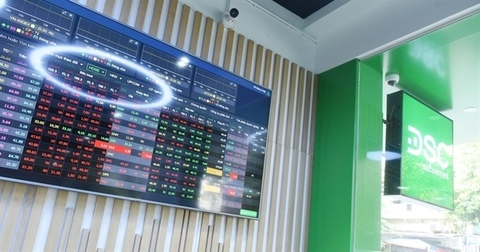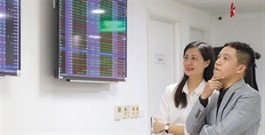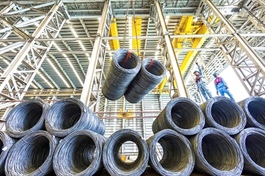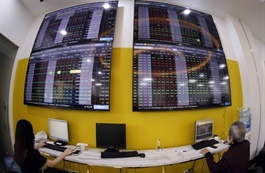Temporary suspension of automatic order placement services a short-term solution
Temporary suspension of automatic order placement services a short-term solution
The temporary suspension of automatic order placement services, or high-frequency trading (HFT), is necessary in the short term, given the recent technological infrastructure capacity of the stock market, but regulators need to allow the deployment of these services in the future.

An electrical board showing stock indices at DSC Securities Co's trading floor. Using robots to place automatic online trading orders with high frequency poses many potential risks and affects the stability of the stock market. — Photo DSC |
High-frequency trading (HFT) is an automated trading platform that large investment banks, hedge funds, and institutional investors employ. It uses powerful computers to transact a large number of orders at extremely high speeds.
These high-frequency trading platforms allow traders to execute millions of orders and scan multiple markets and exchanges in a matter of seconds, thus giving institutions that use the platforms an advantage in the open market.
The State Securities Commission (SSC) has just sent a document to securities companies regarding the use of algorithms, robots and high-frequency orders in placing online stock trading orders, requesting securities companies review and immediately stop these forms of automatic order placement.
According to SSC's assessment, using robots to place automatic online trading orders with high frequency poses many potential risks and affects the stability of the stock market.
It causes a sudden increase in orders from securities companies entering the stock exchanges at the same time, leading to the number of orders entering the floor exceeding the design capacity of the whole system, causing system overload.
According to Trịnh Thanh Cần, General Director of Kafi Securities Company, automatic order placement service supports investors in implementing investment strategies as well as hedging, copy trade, price arbitrage activities for warrants, ETFs, and derivatives products.
“This is a highly developed investment method and is applied in stock investment activities in many developed countries,” he said.
“In Việt Nam, quantitative investment funds have not yet developed strongly, copy trading activities are only at a small-scale experimental level. However, the number of trading orders often increases suddenly at times when market liquidity increases strongly. To accurately determine which activities use high-frequency robots, it is necessary to analyse actual transaction data at stock exchanges.”
“From a business perspective, I would guess that arbitrage activities may have a higher trading frequency, especially at times of high market volatility.”
In fact, automatic order placement activities comply with current laws. However, the current technology infrastructure of the Vietnamese stock market cannot meet this need. For example, HOSE's current system encountered significant problems at times when market liquidity was booming in the 2020 – 2021 period, he said.
Therefore, applying automatic order placement at this time can have a negative impact on the market, especially on small investors. However, management agencies should consider developing the above products soon after upgrading the infrastructure.
Currently, in the US market, the trading proportion of high-frequency trading (HFT) accounts for about 50 per cent of the volume. In European markets, this figure is about 20-30 per cent of daily liquidity. Not only the stock market, but HFT transactions are also popular in the commodity, foreign exchange or cryptocurrency markets, said Bùi Văn Huy, Director of HCM City branch of DSC Securities Company.
At present, temporarily banning the implementation of automatic order placement services is necessary, because it ensures smooth trading for the system, according to Nguyễn Thế Minh, Director of Analysis, Yuanta Viet Securities Company.
“However, automated trading is considered one of the most popular activities in emerging and developed markets. This not only helps increase market liquidity through high-frequency transactions, but also helps investors increase investment efficiency with trading strategies tested by quantitative systems or AI.
“Therefore, in the long term, I think that market management agencies should accelerate the upgrade of trading systems to ensure that automatic trading products are deployed,” he said.
The regulator banning securities companies from placing orders via robots does not have much impact on market liquidity, because currently, only a few securities companies provide this service to customers.
In the Vietnamese stock market, the trading system of stock exchanges’ system was not technologically steady enough to handle the full application of automated order placement services, according to Nguyễn Anh Khoa, Head of Analysis Department, Agribank Securities Company (Agriseco).
“Using robots to increase sudden orders at the same time can lead to system overload, especially in the context of exciting cash flows entering the market today,” he told Việt Nam News.


























